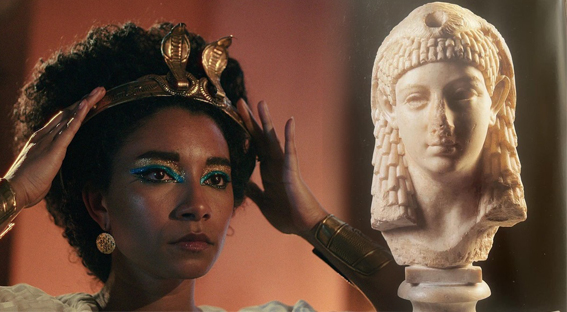On 10 May, the streaming giant Netflix is set to air Queen Cleopatra, a four-part drama-documentary which features the biracial Adele James in the lead role.
The featuring of Cleopatra as a black woman has outraged Egyptians, not simply because solid historical evidence indicates she was fair skinned, but because the production has been categorised by Netflix as a drama documentary, implying that what the viewer sees is historically accurate. Egyptians accused Netflix of Afrocentrist bias, and said the entire matter reeked of “blackwashing”.
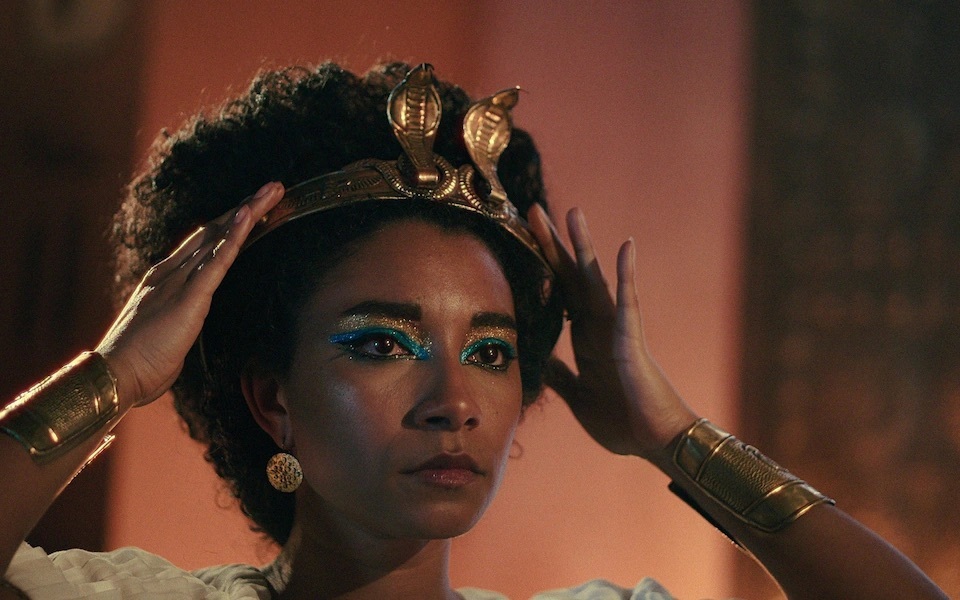
Egypt not white, not black
A petition bannered “Stop the Cleopatra Documentary on Netflix due to historical falsification”, has garnered some 40,000 signatures.
The petition, which was attributed to “the Egyptian people”, stressed that “Cleopatra was born in Alexandria, Egypt, during the Ptolemaic Dynasty which was of Greek origin. She was not black.

“This is in no way against blacks; it is simply a wake-up call to preserve intact the history of Egyptians and Greeks.
“Obviously”, the petition read, “the show is integral to the Afrocentric movement, a pseudo concept that appropriates the civilisation of ancient Egypt and claims it was black African. [We say] Egypt was never black, nor was it ever white; Egypt has always been just that: Egypt.
“There have been numerous great black African civilisations, but Egypt was never one of them.
“Sign this petition to stop the faking of history!”
Blatant historical fallacy
Egypt’s Ministry of Tourism and Antiquities stepped into the fray, posting on its website a statement by the Supreme Council of Antiquities (SCA) on the series.
“The Secretary General of the Supreme Council of Antiquities confirms that Queen Cleopatra had light skin and Hellenistic (Greek) features,” the statement said.
SCA Secretary-General Mostafa Waziri wrote in the statement:
“The leading lady with African features and dark skin represents a falsification of Egyptian history and a blatant historical fallacy, especially given that the film is classified as a documentary, which requires those in charge of its production to exercise accuracy and rely on historical and scientific facts to ensure that history and civilisations are not falsified.
“Statues of the queen and her depictions on coins show her with Hellenistic features: fair skin, a drawn-out nose and thin lips.”

Mr Waziri denied that the furore was about racism. “Rejection of the film is sparked out of defence of history. Queen Cleopatra VII represents an important and authentic part of the ancient history of Egypt. This is far from any ethnic racism, or from our full respect for African civilisations and for our brothers in the African continent to which we all belong,” he said.
Afrocentrist
The producers of the show expressed surprise at the Egyptian reaction.
A statement which they posted on the Netflix website said: “Working with leading historians and experts including Shelley Haley (Professor of Classics and African Studies, Hamilton College) and Dr Sally-Ann Ashton (Cleopatra scholar), we explore Cleopatra’s story as a queen, strategist, ruler of formidable intellect as well as a woman whose heritage is the subject of great debate.
“Her ethnicity is not the focus of Queen Cleopatra, but we did intentionally decide to depict her of mixed ethnicity to reflect theories about Cleopatra’s possible Egyptian ancestry and the multicultural nature of ancient Egypt.”
Producer Jada Pinkett Smith said: “I really wanted to represent black women. We don’t often get to see or hear stories about black queens, and that was really important for me.”
The idea of Cleopatra as a black woman has been proposed by Afrocentist scholars; a trailer for the documentary includes the quote: “I don’t care what they tell you in school, Cleopatra was black.”
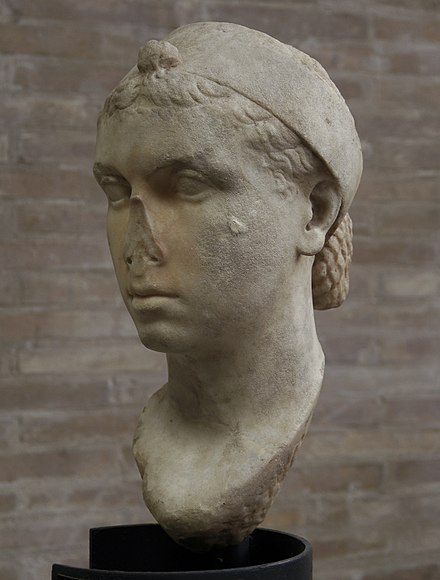
Historically, however, Cleopatra was of Greek ancestry. Her official coinage and her three busts, which match her coins, depict her with Caucasian features, as a Greek woman in style. She was directly descended from an unbroken male line of Macedonian Greek rulers, beginning with Ptolemy, who became ruler of Egypt in 305BC after Alexander the Great’s death when his empire was broken up between his generals. The dynasty came to an end with Roman conquest in 30BC, when Cleopatra was defeated, together with the Roman general Mark Antony with whom she had a personal and political relation, by the Roman fleet led by Octavian in the naval battle of Actium. Egypt was annexed to the Roman Empire, and Octavian became Augustus Caesar.
Nothing against dark skin
Zahi Hawwas, renowned Egyptologist and former State Minister of Antiquity Affairs, confirms that all historical evidence points to a fair skinned Cleopatra. “In addition to her busts and depictions in coins found at the temple of Taposiris Magna west of Alexandria, none of which revealed any black traits,” Dr Hawwas told Watani, “the only image of her with her son Caesarion, on the facade of Hathor temple in Dendara south of Egypt, depicts no African features.” All of which, he said, prove that the Netflix show involves falsification of history.
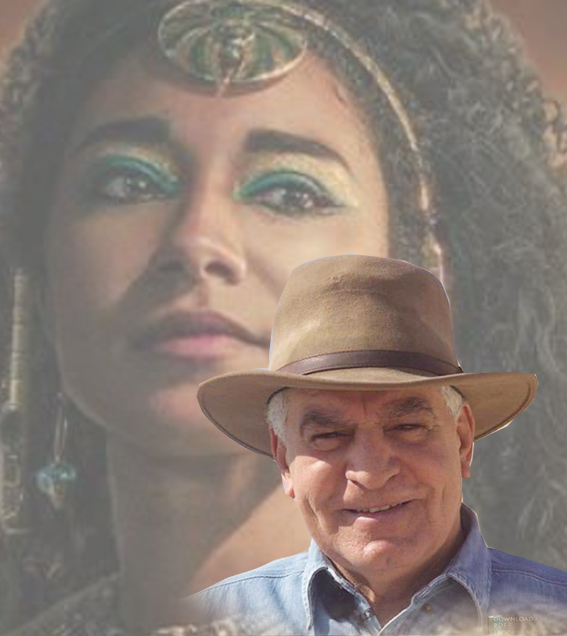
“Egyptians were never black Africans,” Dr Hawwas said. Imagery on the walls of Egyptian temples show wars between Egypt and African or Asian countries, depicting each race with its well-known typical features; Egyptians and Africans are depicted typically different from one another.
“We have nothing against blackness or black skin,” Dr Hawwas said, “but about faking history.”
The only time in history when Egypt had dark-skinned rulers was during the Late Period in 664 – 332BC; these were Kushite kings who came from the south but were not Egyptian.
Despite his total objection to Netflix’s Queen Cleopatra, Dr Hawwas rejects the call to ban screening the film. “A good response would be to produce another film that would adhere to historical facts,” he said.
Aghast
Egyptologist and medical doctor Wassim al-Sisi was aghast at the historical fallacies of Netflix’s Queen Cleopatra. “How could such fallacies be accepted?” an appalled Dr Sisi told Watani. “Cleopatra was the ruler of Egypt, a Queen whose beauty and charm seduced the mighty men of Rome: Julius Caesar and Mark Antony.

She was bright and smart; she spoke nine languages including the ancient Egyptian. She called herself the new Isis—Isis being the beloved Egyptian goddess. Her praises were sung by Egypt’s poets and singers; she was in a play by Shakespeare and was the heroine of a play by Egypt’s poet laureate Ahmed Shawqy (1868 – 1932). Now Cleopatra has been appropriated by Afrocentrics who are attempting to appropriate our entire history!”
Neorealism
For his part, history researcher Wassim Afifi, confirms the idea that the Netflix “documentary” has failed on two counts: it includes blatant historical errors, and it is no documentary in the first place because it disregarded the hard facts.

“Some modern opinions, such as Sally Ashton’s, say that Cleopatra was not white,” said Mr Afifi to Watani, “but such notions lack evidence. In fact, all the evidence found indicates she is of Macedonian origin, meaning she would be fair like the Greeks, or of a light tone of brown like Egyptians. But she could never be black.
“Netflix has been known to promote Afrocentrism, a movement which appropriates our history. This should not be accepted and should be seriously challenged in every way. Criticism on social media is fine, but much better would be to produce documentary works that offer the full substantiated facts.”
According to film critic Tareq al-Shennawi: “We live in an age of neorealism, meaning in this case that commonly circulated “facts” which are no facts at all largely spread and are translated in a modern sense to be real facts. Actual reality is thus displaced by neorealism. All what we say now about the real Cleopatra will be forgotten, and Netflix’s black Cleopatra will remain forever as a prevailing modern fact.
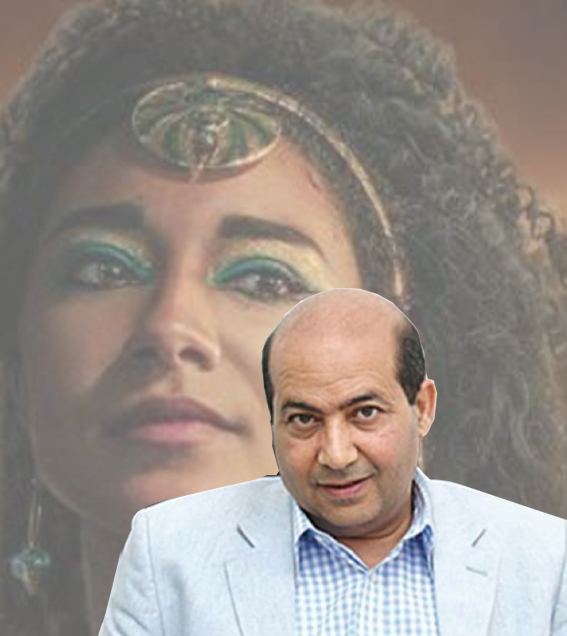
“We thus need strong, effective tools by which to fight the fallacies and propagate the facts. This should be our main concern,” he told Watani.
For her part, MP Saboura al-Sayed has made a move in the House of Representatives asking the government to ban Netflix or take measures against the streaming giant for appeasing Afrocentrism by falsifying of Egyptian history.
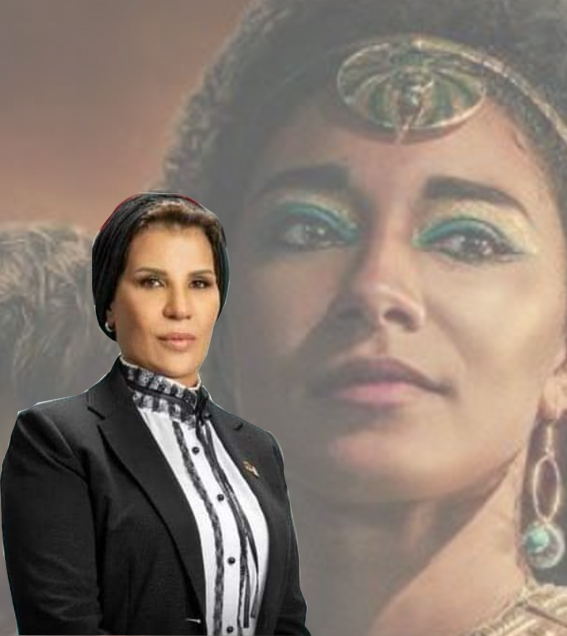
Patience, oh Lord!
The media and social media inside and outside Egypt carried uncountable comments on the topic of Netflix’s Queen Cleopatra.
Overwhelmingly, those who supported a black Cleopatra had one argument: that she was indeed black. What proof or evidence? None whatsoever.
The UK television personality and host Piers Morgan hosted Egyptian comedian and TV host Bassem Youssef who is now resident outside Egypt, for his view of the issue. Youssef was outraged at views that Cleopatra would be depicted as African, insisting that Africa had so many wonderful civilisations, so why should they appropriate the Egyptian’s? When confronted with the idea that any actor should be able to play any part, he again replied that Queen Cleopatra was a documentary, so should have stuck to the facts and picked the right actor to represent an Egyptian or a Greek. He harshly criticised cultural appropriation, saying he was tired of Africans or Jews claiming they were the ones who built the pyramids.
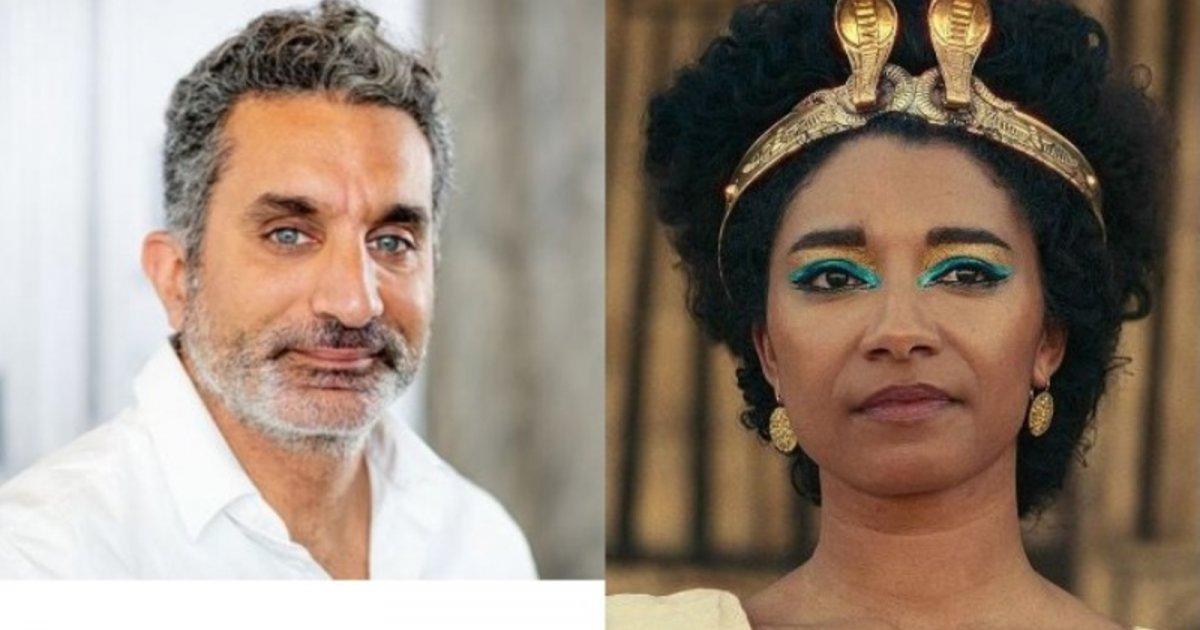
Regarding the appropriation of Egyptian history, renowned Egyptian opera singer Amira Selim, posted on her Twitter account an image of ancient Egyptians raising their hands to their foreheads in a gesture that implies going out of one’s mind. The caption read: “When you spend years building the pyramids and people say it was aliens who did it.” Ms Selim’s comment: “Oh God, give me patience!”
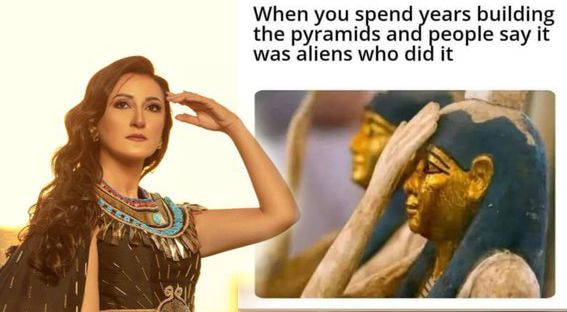
In the Daily Telegraph, one reader (Jane Weitzmann) comment read: “Surely if you want to promote successful black queens, Jada, make a programme about a real one, don’t appropriate white ones like Cleopatra and Anne Boleyn. That only implies that there aren’t any black ones to promote.” Numerous comments ran to the effect that “would it be ok for a white actor to play Nelson Mandela or Barak Obama?”
Watani International
3 May 2023


